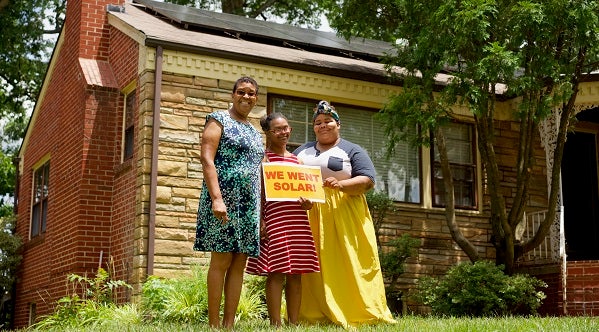Tell the D.C. PSC to move from talk to action on grid reform

The D.C. Public Service Commission (PSC) is once again accepting comments on the process for reforming the way electricity is generated and distributed in the District. We call this process grid reform, though others have called it “grid of the future,” and the PSC refers to this process as “modernizing the energy delivery system for increase sustainability,” or “MEDSIS.” If done correctly, grid reform will create a more democratic, lower cost, reliable, and renewable electric grid for all District residents. Unfortunately, the PSC is dragging its feet. We need to show them the public is watching.

Currently, the PSC is seeking comments on its proposed MEDSIS Vision Statement released in October in response to previous rounds of public comment. You can urge the PSC to act by submitting comments directly to the PSC through Monday, December 18, or to make it easy we set up a comment page on the Solar United Neighbors website.
How we got here
The current comment period is just the latest step in a process stretching back to June 2015. That’s when the PSC initially opened the MEDSIS proceeding, also known as FC No. 1130, to identify technologies and policies that can help modernize our energy delivery system to make it more reliable and efficient while also increasing its sustainability. Following the initial round of comment, the PSC released a report and held a public town hall meeting in early 2017 to explain the highly technical document to the public. While we were disappointed with the results of the public forum, we continued to engage in the process. In March of this year, we submitted our comments proposing a set of guiding principles that the PSC should adopt for the process. We also suggested that they define the terms of the discussion before requesting public comments on specific pilot programs that might be enacted as part of the broader reform.
In October, PSC staff released a MEDSIS Vision Statement that took a step in the right direction toward establishing a clear path for future grid reform. But the PSC must also adopt clear guiding principles to support the vision statement—like those we outlined in our previous comments from earlier in the year. Furthermore, the PSC should name specific working groups with diverse stakeholders that can jump start the process.
While the working groups can take several forms, we have a few suggestions about where the PSC can start. One of the working groups should focus on non-wire alternatives to infrastructure upgrades, a concept the PSC has already identified as a key component for ensuring affordability. This would mean that when energy demand increases in D.C. due to new development, we should look beyond traditional energy infrastructure upgrades—such as Pepco’s nearly $1 billion in proposed capital expenditures over the next decade—that we all must pay for as part of our electric bill, and that utilities like to build because they are guaranteed profit in the process. Instead, we could be making innovative investments that keep the locally generated benefits in the community—like solar, storage, energy efficiency, and demand management programs. Many studies, including from our own DOEE, show that these alternative investments are necessary to save D.C. residents money by realizing the economic potential of local energy generation and to meet our renewable energy goals. These are the kind of alternative pathways that the grid reform proceeding is designed to explore.
Another working group should focus on electrification of transportation. Pepco also has plans in this area and the PSC already ruled that their electric vehicle (EV) proposal should be folded into the MEDSIS proceeding. We need to make sure that transportation electrification serves the needs of all Washingtonians. Since low income communities tend to be the ones most impacted by emissions, EV buses and trucks could lead the way for clean air corridors.
Properly harnessed, grid reform has the potential to reshape D.C.’s energy system so that it is equitable, sustainable, and healthy for us all. But that will only happen with the input of truly diverse stakeholders—not just industry insiders and insular policy communities. Working groups can help reach that goal by focusing on real issues that lead to real projects and tangible benefits for all communities.
After more than two years spent laying the foundation for grid reform, it’s time to move from talk to action.
To ensure that the grid modernization is equitable and democratic, the PSC must hear from you. We urge you to submit public comments on the MEDSIS Vision Statement. Tell the PSC to adopt the guiding principles we filed in March 2017 and to act now to modernize the grid.
